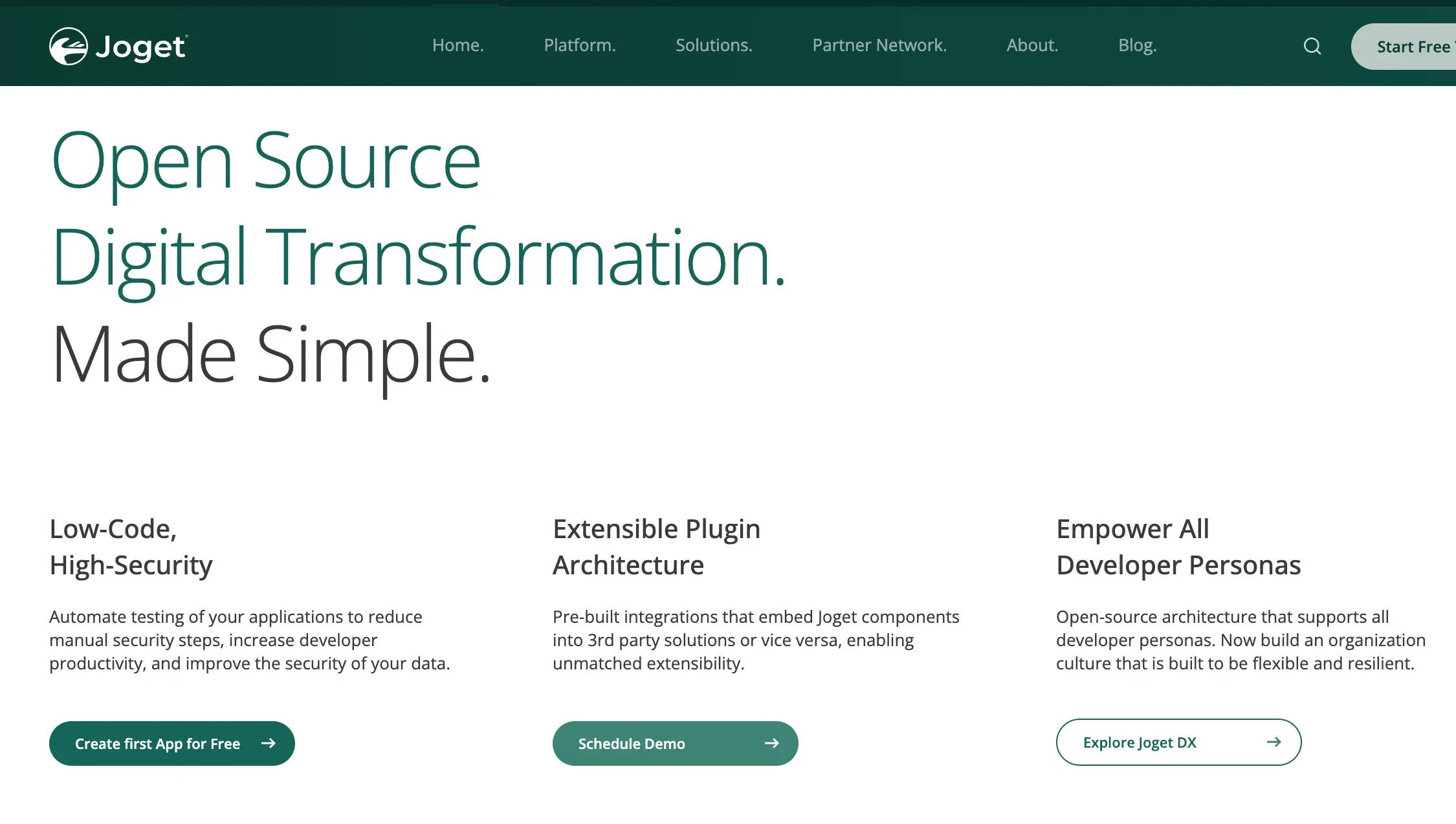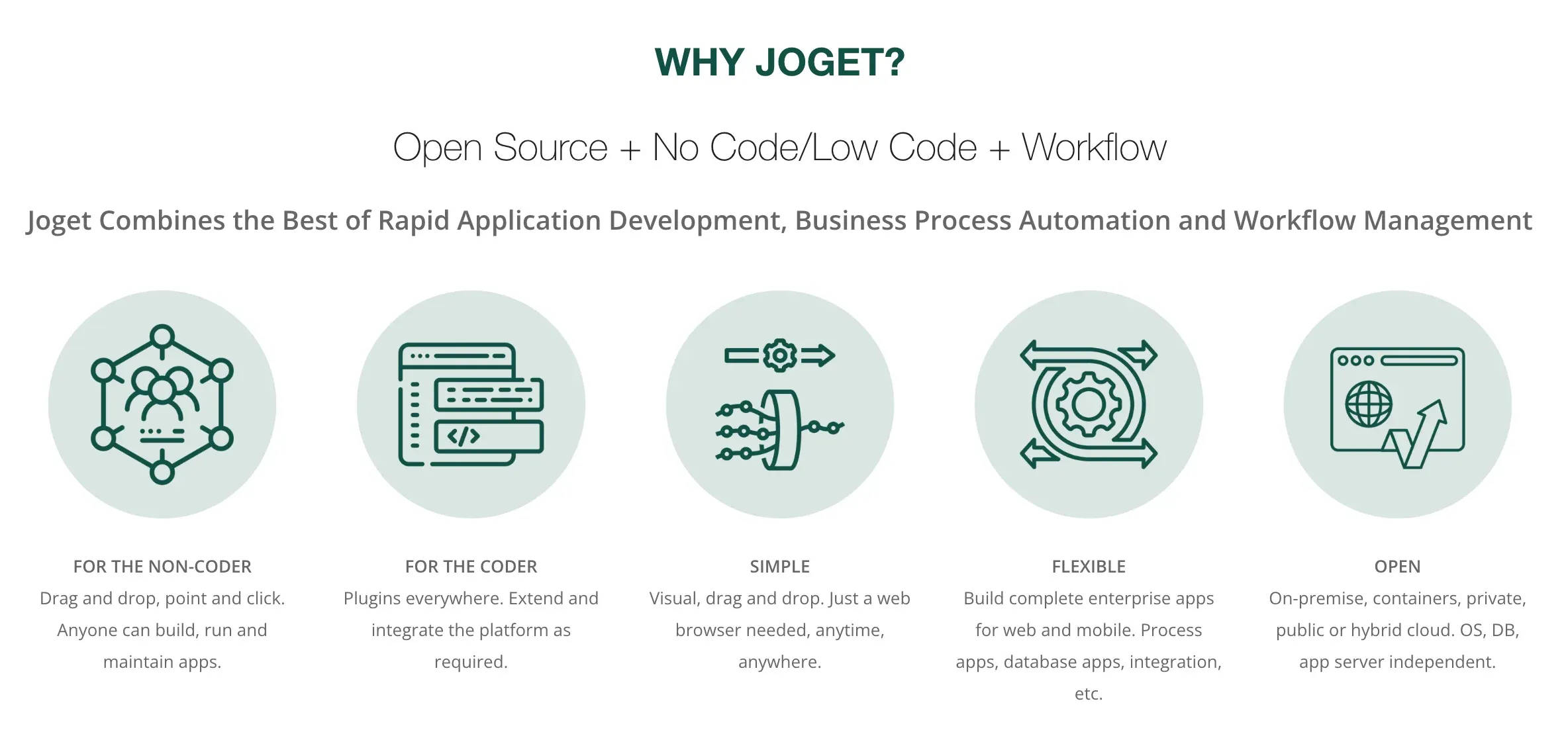- Joget Community vs Enterprise
- What Are Joget's Pros and Cons?
- Free Joget Alternatives
- Premium Joget Alternatives
- Conclusion
- Frequently Asked Questions (FAQs)
Table of Contents
Joget Overview: Pros, Cons, and Alternatives

Joget is a low-code/no-code platform designed to help businesses build applications quickly without extensive coding. It simplifies workflow automation, form building, and process management, making it a valuable tool for developers and non-technical teams.
Originally developed by Joget Inc., the platform started as a business process automation tool.
In 2011, it evolved into a full-fledged open-source application, empowering businesses with greater flexibility and customization.
Joget runs on multiple operating systems like Windows, Linux, Unix, and Solaris, with Java as its core programming language. Its open-source model allows businesses to scale and tailor solutions to their needs.
However, like any tool, Joget has limitations—especially in its free version.
In this article, we’ll explore Joget's pros and cons and the best free and paid Joget alternatives to help you decide if it’s the right fit.
Joget Community vs Enterprise
Choosing between Joget Community and Joget Enterprise depends on your organization's needs.
The former is free, while the latter is a paid version with advanced features.
Let's explore the differences to help you make an informed decision.

Joget Community Edition
The Community Edition is Joget's open-source low-code platform, available for free. It offers essential features for building applications, such as:
- Visual Development Tools: Create forms, workflows, and user interfaces with a drag-and-drop interface.
- Basic Plugins: Access to standard plugins for common functionalities.
- Community Support: Engage with a global community for assistance and shared resources.
However, there are some limitations
- Limited Advanced Features: Lacks some of the advanced capabilities found in the Enterprise Edition.
- No Official Support: Relies solely on community forums for troubleshooting and guidance.
- Scalability Constraints: May not be suitable for large-scale enterprise deployments requiring extensive governance and compliance.
This edition is ideal for small businesses, startups, or individual developers looking to explore Joget's capabilities without financial investment.
Joget Enterprise Edition
The Enterprise Edition is designed for organizations that require robust features, enhanced security, and professional support. Key benefits include:
- Advanced Governance and Compliance: Features like the Governance Hub provide end-to-end governance, ensuring compliance and proactive risk management.
- Performance Monitoring: The Monitoring Hub allows for effective management and monitoring of all applications, ensuring optimal performance.
- Enhanced Security: Robust security measures, including role-based access control and data encryption, to protect sensitive information.
- Professional Support: Direct access to Joget's support team for assistance in design, development, deployment, and management of applications.
The licensing and pricing for the Enterprise Edition vary based on factors like the number of users and deployment requirements. It's best suited for medium to large enterprises that need a scalable, secure, and fully supported platform.
Which Edition Should You Choose?
If you're a small team or individual looking to experiment with Joget services, the Community Edition offers a cost-effective entry point. However, investing in the Enterprise Edition would be beneficial if your organization demands advanced features, stringent security, and dedicated support.
Regardless of your choice, Joget software provides a flexible and efficient way to develop applications with minimal coding.
Suggested Reading
What Are Joget's Pros and Cons?
Joget can create apps in days while tradition development may takes months for the same task.
While it offers speed, flexibility and scalability, it’s essential to weigh both the benefits and drawbacks before choosing it over other Joget alternatives.
Pros of Using Joget
✅ Low-Code Development – With Joget software, businesses can build applications quickly using a visual drag-and-drop interface.
It reduces dependency on developers and speeds up digital transformation.
✅ Open-Source Option – The Joget Community vs Enterprise debate often starts with cost.
The Community Edition is free, making it ideal for startups and small teams that need a basic open-source low-code platform.
✅ Customizable Workflows – Joget services include powerful automation features that allow organizations to build custom workflows, automate repetitive tasks, and enhance efficiency.
✅ Integration Capabilities – Joget software integrates with databases, cloud storage, APIs, and third-party tools, enabling businesses to connect their systems seamlessly.
✅ Scalability – Whether you’re a small business or a large enterprise, Joget supports different levels of scalability, making it a flexible solution for growing needs.
Suggested Reading

Cons of Using Joget
🚫 Limited Free Features – While the Joget Community Edition is free, it lacks advanced tools, security features, and official support found in Joget Enterprise.
🚫 Learning Curve – Despite being an open-source low-code platform, users may still need technical knowledge for complex customizations, integrations, and scripting.
🚫 UI/UX Limitations – Compared to some Joget alternatives, the interface can feel outdated, especially when designing visually appealing applications.
🚫 Performance Issues – With complex workflows and heavy data processing, Joget software may experience slowdowns, requiring optimization and resource management.
🚫 Pricing for Enterprise – The Enterprise Edition offers enhanced Joget services, but at a cost. Businesses must evaluate whether the premium features justify the investment.
Joget is a great open-source low-code platform for businesses seeking a flexible and customizable application development solution.
However, Joget alternatives with more modern UI, better performance, or different pricing structures might be worth exploring depending on your needs.
Free Joget Alternatives
Numerous Low-Code platforms are matching Joget services for rapid application development.
We have curated a short list of open-source platforms that are largely free to experiment for small teams and citizen developers.
1. Node-RED
Node-RED is an open-source, flow-based development tool that allows users to connect hardware devices, APIs, and online services using a visual drag-and-drop interface.
Originally developed by IBM, it has grown into a widely used platform for IoT applications, system automation, and real-time data processing.
With its extensive node library and JavaScript support, Node-RED simplifies complex workflows and enables seamless integrations across various technologies.

Features
- Browser-Based Flow Editing: Design workflows using a visual drag-and-drop interface.
- JavaScript Functionality: Create custom functions within the editor using JavaScript.
- Built-In Library: Save and reuse functions, templates, or flows for future projects.
- Extensive Node Palette: Access a wide range of pre-built nodes for various tasks.
- Real-Time Deployment: Deploy changes instantly without restarting the runtime.
- Community Support: Benefit from a large community offering shared nodes and flows.
- Pricing: Node-RED is free to use under the Apache 2.0 license.
2. Budibase
Budibase is an open-source low-code platform that helps businesses build internal tools and applications quickly.
It simplifies form creation, workflow automation, and data integration with a drag-and-drop interface.
As one of the leading Joget alternatives, it offers self-hosting options and customization capabilities, making it a flexible choice for teams needing efficient Joget software without high development costs.

Features
- Form Builder: Design forms with a user-friendly interface.
- Data Source Integration: Connect to various databases and APIs seamlessly.
- Automated Workflows: Set up triggers and actions to automate processes.
- Customizable Components: Utilize pre-built components or create your own.
- Self-Hosting Option: Deploy on your infrastructure for full control.
- User Access Control: Manage permissions and roles for team members.
- Pricing: Budibase offers a free tier with basic features. Premium plans start at $8 per user/month.
3. Appsmith
Appsmith is an open-source platform designed for building internal applications with ease, catering to both developers and non-developers.
Appsmith is ideal for developers and technical teams seeking an open-source, low-code platform to rapidly build internal tools, dashboards, and admin panels.

Features
Drag-and-Drop UI Builder: Create interfaces effortlessly using pre-built widgets.
API Integrations: Connect to REST APIs, databases, and GraphQL endpoints.
JavaScript Logic: Incorporate custom logic using JavaScript within the platform.
Version Control: Manage application versions with Git integration.
Real-Time Collaboration: Work simultaneously with team members on projects.
Community Support: Access a vibrant community for plugins and assistance.
Pricing: Features a free community plan. Business Plan stars from $0.40 per user/hour, capped at $20 per user/month. Enterprise plans for large organizations with specific needs.
Premium Joget Alternatives
If you're looking for Joget software replacements with premium functionalities, these paid platforms provide extensive Joget services for custom app development, integrations, and security.
1. OutSystems
OutSystems is an enterprise-ready Joget alternatives that accelerates app development with AI-driven automation, full-stack visual modeling, and robust security.
It supports multi-cloud deployment, seamless integrations, and performance monitoring, making it a preferred choice for large enterprises needing scalable Joget services for complex applications.

Features
Full-Stack Visual Development: Design both front-end and back-end with visual tools.
AI-Powered Assistance: Leverage AI to optimize and suggest application logic.
Robust Security: Built-in security features to protect applications.
Scalability: Handle large-scale enterprise applications efficiently.
Extensive Integrations: Connect with various systems and databases seamlessly.
Performance Monitoring: Tools to monitor and optimize application performance.
Pricing: Free tier available; paid plans start at $36,300 per year, offering full enterprise support, enhanced security, and AI-powered optimizations.
2. Mendix
Mendix is a cloud-native Joget alternative offering a model-driven development approach for building apps with minimal coding.
It features AI-assisted development, multi-cloud compatibility, reusable components, and enterprise-grade security, making it ideal for teams that require Joget software alternatives with strong collaboration tools and automation.
Features
Visual Modeling: Develop applications using intuitive visual models.
Multi-Cloud Deployment: Deploy applications across various cloud environments.
Collaboration Tools: Facilitate teamwork with built-in collaboration features.
Reusable Components: Utilize and share components across projects.
AI-Assisted Development: Enhance development with AI-driven suggestions.
Comprehensive Security: Ensure applications meet enterprise security standards.
Pricing: Mendix offers a free tier for small apps. Paid plans start at €10.50 per user/month.
3. Microsoft Power Apps
Microsoft Power Apps is a powerful Joget alternative designed for businesses seeking deep integration with Microsoft 365, Dynamics, and Azure.
It simplifies app creation with drag-and-drop tools, AI-driven automation, and secure cloud-based deployment, making it a solid Joget services replacement for organizations using Microsoft’s ecosystem.

Features
Drag-and-Drop Builder: Create apps easily using an intuitive visual interface.
AI-Powered Automation: Use AI to optimize workflows and enhance app functionality.
Seamless Microsoft Integration: Connect effortlessly with Office 365, Dynamics 365, and Azure.
Multi-Device Compatibility: Deploy apps across web, mobile, and tablet platforms.
Prebuilt Templates: Speed up development with ready-to-use app templates.
Enterprise-Grade Security: Ensure data protection with Microsoft’s built-in security measures.
💰 Pricing: Starts at $5 per user/month for basic apps, with premium plans offering enterprise security, AI models, and unlimited integrations.
Conclusion
Joget is one of the best open-source low-code platform, but it has its limitations—especially in scalability, security, and enterprise-grade support.
Exploring Joget alternatives can help you find a low code development tool better suited for your business.
Free options like Node-RED, Budibase, and Appsmith provide flexibility, while premium platforms like OutSystems, Mendix, and Microsoft Power Apps offer advanced features, generative AI, and enterprise support.
If you're looking to maximize Joget software without the hassle, AppsRhino provides expert Joget development services to build, optimize, and scale your applications.
Need custom workflows or integrations? Hire Joget developers from AppsRhino and let us handle the heavy lifting while you focus on growing your business.
Frequently Asked Questions (FAQs)
What is Joget used for?
Joget is an open-source low-code platform for building workflow-driven applications.
It simplifies app development, automates business processes, and integrates with various systems through plugins & API integrations, making it ideal for enterprises needing rapid digital transformation.
What is the difference between Joget Community and Enterprise?
Joget Community vs Enterprise: The Community edition is free with basic features, while the Enterprise version offers advanced security, scalability, enterprise support, and premium plugins for large-scale business applications.
What are some free Joget alternatives?
Popular free Joget alternatives include Budibase, Appsmith, ProcessMaker, and Node-RED.
These platforms provide low-code/no-code app development, workflow automation, and integrations, catering to businesses seeking cost-effective solutions.
Table of Contents
- Joget Community vs Enterprise
- What Are Joget's Pros and Cons?
- Free Joget Alternatives
- Premium Joget Alternatives
- Conclusion
- Frequently Asked Questions (FAQs)





